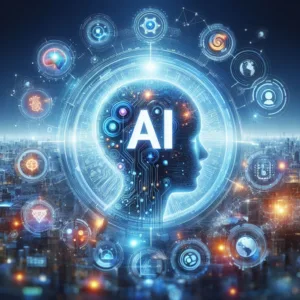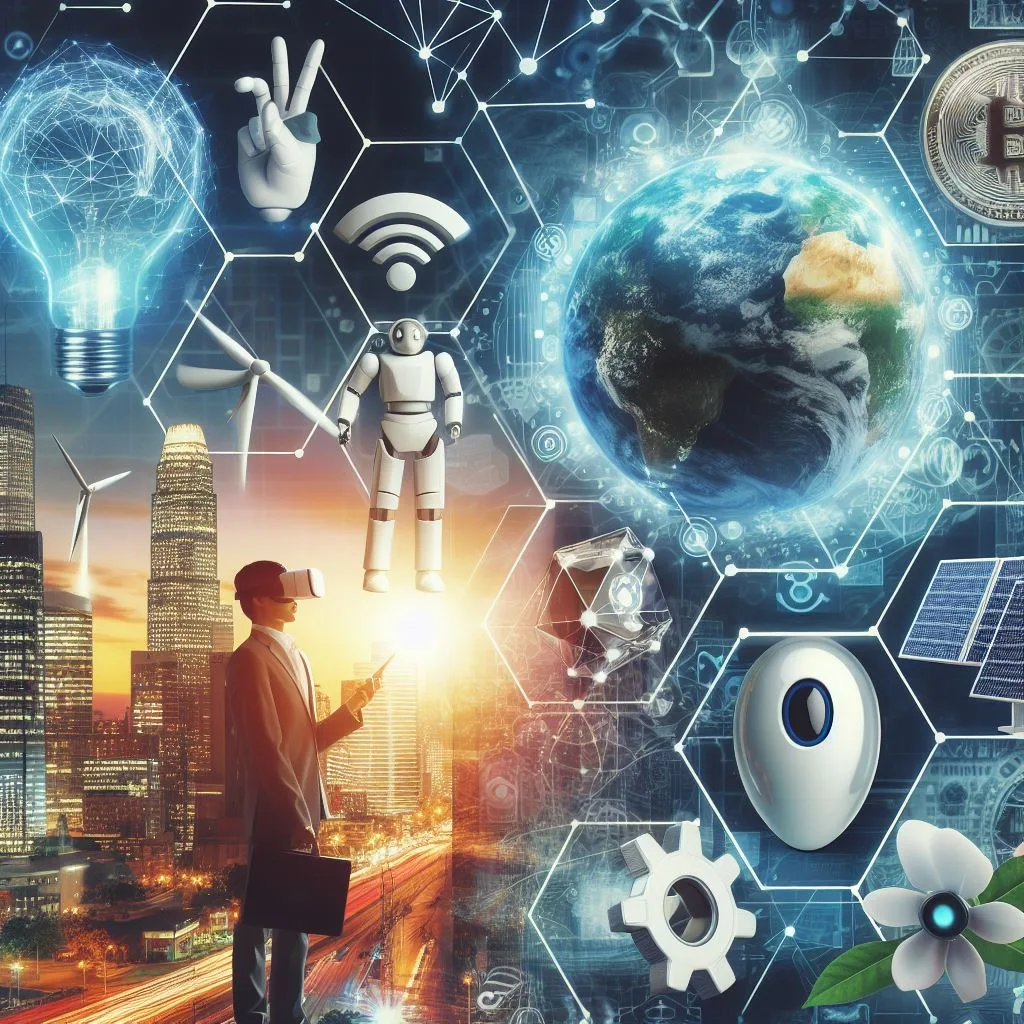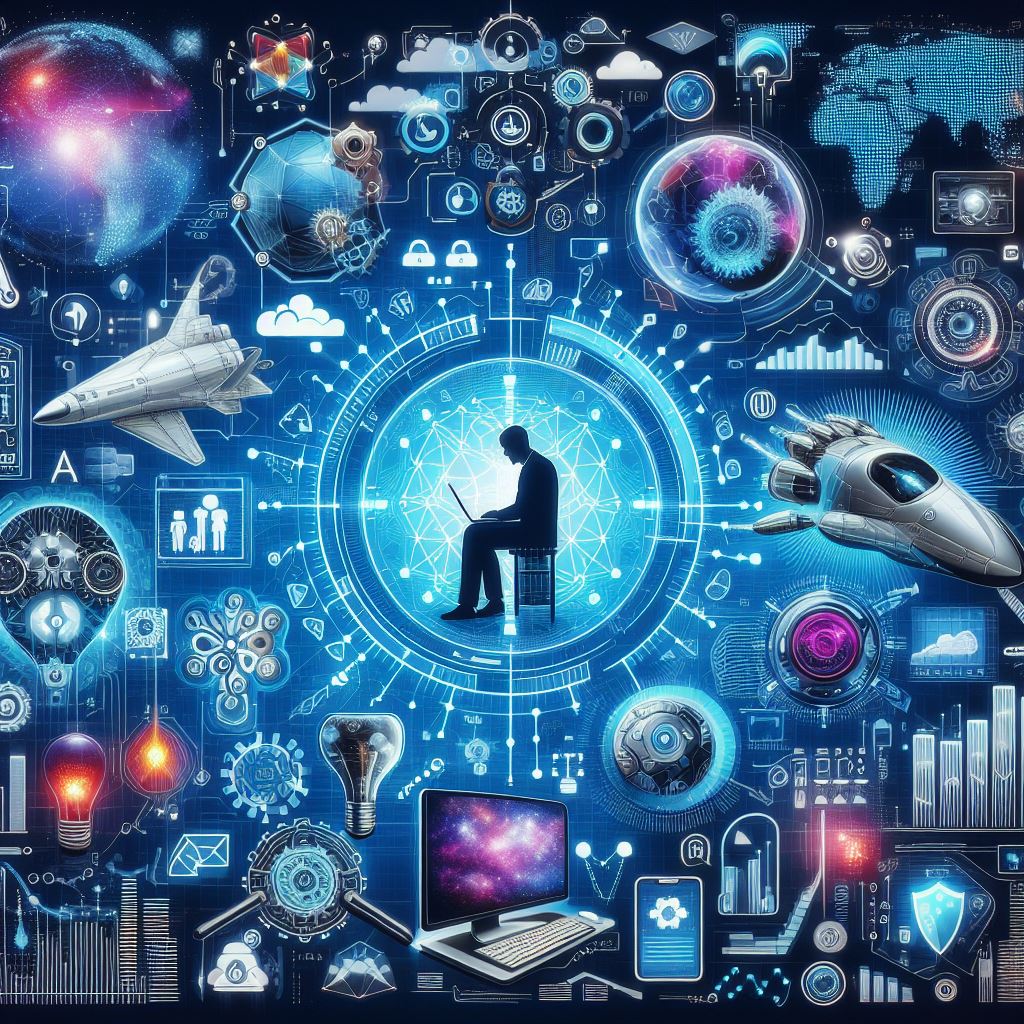Staying ahead in the business world requires embracing innovation and leveraging the latest advancements. In 2024, the top 5 emerging technologies are set to revolutionize various industries, offering new ways to enhance efficiency, improve customer experiences, and foster sustainable practices. These technologies include Artificial Intelligence (AI) and Machine Learning (ML), the Internet of Things (IoT), Blockchain, Augmented Reality (AR) and Virtual Reality (VR), and Clean Technology (Cleantech). Let’s explore how these cutting-edge innovations are transforming the business landscape.
1. Artificial Intelligence (AI) and Machine Learning (ML)
Artificial Intelligence (AI) and Machine Learning (ML) are at the forefront of technological innovation, driving transformative changes across industries in 2024. AI systems, equipped with advanced ML algorithms, are now capable of performing complex tasks that were once the exclusive domain of human intelligence. These technologies are enhancing decision-making processes, optimizing operational efficiencies, and personalizing user experiences.
transformative changes across industries in 2024. AI systems, equipped with advanced ML algorithms, are now capable of performing complex tasks that were once the exclusive domain of human intelligence. These technologies are enhancing decision-making processes, optimizing operational efficiencies, and personalizing user experiences.
Business Applications:
- Consumer Insights: AI-powered analytics provide deep insights into consumer behavior, enabling companies to tailor their strategies to meet evolving market demands. For instance, retailers can analyze purchase patterns to predict future buying trends, ensuring they stock the right products at the right time.
- Automation: Machine Learning automates routine tasks, freeing up human resources for more creative and strategic roles. In customer service, chatbots powered by ML can handle common inquiries, allowing human agents to focus on complex issues.
- Healthcare, Finance, and Cybersecurity: Predictive models are improving diagnostics by analyzing patient data to detect diseases early. In finance, AI algorithms optimize investment strategies by predicting market movements. Cybersecurity firms use ML to identify and respond to threats in real-time, enhancing the protection of sensitive data.
Ethical Use:
- The ethical and responsible use of AI and ML is becoming a central focus, with emphasis on transparency, fairness, and accountability. Organizations are adopting ethical guidelines to ensure AI systems do not perpetuate biases or infringe on privacy rights.
Future Prospects:
- As these technologies continue to mature, they promise to unlock new possibilities, drive innovation, and serve as catalysts for economic growth and societal progress. AI and ML are expected to integrate more seamlessly into everyday applications, making tools and services smarter and more intuitive.
For more insights into the future of AI, visit The Future of AI: Anticipating the Breakthroughs of 2024 and Machine Learning: Types, Applications, Future, and Challenges.
2. Internet of Things (IoT)
The Internet of Things (IoT) is rapidly evolving as a pivotal technology in 2024, shaping the future of business and society with its vast network of connected devices. This year, IoT is witnessing significant advancements, particularly through the integration of Artificial Intelligence (AI) and Machine Learning (ML), which are enhancing the capabilities of IoT systems to process data and make autonomous decisions.
Key Developments:
- 5G Integration: The convergence of 5G, AI, and edge computing makes IoT devices more efficient and intelligent, capable of performing real-time analytics and actions at the network’s edge. This reduces latency and increases the speed of operations, enabling businesses to respond swiftly to market changes and customer needs.
- Smart Cities: IoT plays a crucial role in managing resources, traffic, and energy systems, improving the quality of life for residents. Smart streetlights, waste management systems, and energy grids are just a few examples of IoT applications that make urban living more sustainable and efficient.
- Industrial IoT: Revolutionizing manufacturing processes through predictive maintenance and optimized supply chains, leading to increased productivity and reduced operational costs. Factories equipped with IoT sensors can monitor machinery in real-time, predicting when maintenance is needed and preventing costly downtime.
Security Focus:
- Robust security measures are being developed to protect the vast amounts of data generated by IoT devices, ensuring trust and reliability in IoT ecosystems. This includes encryption, authentication protocols, and regular security updates to safeguard against cyber threats.
Case Study:
- Smart Homes: An example of IoT in action is the rise of smart home devices. Thermostats, security cameras, and appliances connected to the internet allow homeowners to control their environment remotely, enhancing convenience and energy efficiency.
3. Blockchain
Blockchain technology is poised to redefine the digital landscape in 2024, offering unprecedented security and transparency for transactions across various sectors. This decentralized ledger system is gaining traction for its ability to facilitate secure, peer-to-peer transactions without the need for intermediaries, thereby reducing costs and increasing efficiency.
Trends:
- Cryptocurrency Adoption: Mass adoption of cryptocurrencies is becoming more integrated into everyday financial transactions. Companies like Tesla and PayPal have started accepting Bitcoin, signaling mainstream acceptance.
- Central Bank Digital Currencies (CBDCs): These are modernizing the monetary systems of nations around the world. Countries like China and Sweden are already piloting their digital currencies, aiming to enhance payment efficiency and financial inclusion.
Advancements:
- Interoperability: Improvements in blockchain interoperability are breaking down silos between different platforms, allowing for seamless data sharing and value transfer. Projects like Polkadot and Cosmos are leading the way in creating interconnected blockchain ecosystems.
- Decentralized Finance (DeFi): DeFi is maturing rapidly, offering innovative financial solutions such as decentralized exchanges, lending platforms, and insurance products. These platforms provide greater accessibility to financial services without traditional banking infrastructure.
Enhanced Security:
- Blockchain’s security measures and evolving regulatory landscapes ensure the stability and trustworthiness of blockchain networks. The use of smart contracts, which automatically execute transactions based on predefined conditions, adds an extra layer of security and efficiency.
Future Role:
- Blockchain is set to play a crucial role in the Metaverse, expanding possibilities for virtual economies and digital identities. Virtual worlds like Decentraland and The Sandbox are using blockchain to enable ownership of digital assets and land.
For expert predictions and insights into blockchain technology in 2024, check out Blockchain Tech Predictions for 2024 from Experts at Ripple.
4. Augmented Reality (AR) and Virtual Reality (VR)
Augmented Reality (AR) and Virtual Reality (VR) are reshaping the digital era, especially in 2024, as they create immersive experiences that blur the lines between the physical and virtual worlds. AR enhances the real world by overlaying digital information onto it, while VR transports users into entirely simulated environments.
in 2024, as they create immersive experiences that blur the lines between the physical and virtual worlds. AR enhances the real world by overlaying digital information onto it, while VR transports users into entirely simulated environments.
Business Applications:
- Retail and E-Commerce: AR allows customers to visualize products in their own space before purchasing. IKEA’s AR app, for example, lets users see how furniture will look in their homes.
- Training and Development: VR provides realistic simulations that improve learning outcomes and retention. Companies like Walmart and UPS use VR to train employees in customer service and safety protocols.
Healthcare Innovations:
- Surgical Assistance: Surgeons use AR for enhanced visualization during procedures, improving precision and outcomes. VR is also used for pre-operative planning and patient education.
- Patient Rehabilitation: VR is employed for patient rehabilitation and therapy, offering engaging and controlled environments for recovery. Stroke patients, for instance, can use VR to practice motor skills in a fun and motivating way.
Entertainment and Education:
- Virtual concerts and gaming experiences are becoming more sophisticated and interactive. VR platforms like Oculus Rift and PlayStation VR offer immersive gaming experiences, while artists like Travis Scott have performed virtual concerts in Fortnite.
- AR and VR are providing students with interactive and engaging learning experiences. Virtual field trips, 3D modeling, and immersive historical reenactments make learning more dynamic and memorable.
Integration with AI and IoT:
- Combining AR/VR with AI and IoT will lead to more personalized and context-aware experiences. For example, AR navigation apps can use AI to suggest the best routes based on real-time traffic data, while IoT devices in smart homes can create personalized VR environments for relaxation or entertainment.
For more on the most innovative companies in AR and VR, visit Augmented Reality & Virtual Reality: Most Innovative Companies 2024.
5. Clean Technology (Cleantech)
Clean Technology, commonly referred to as Cleantech, encompasses a diverse range of products, services, and processes, all designed with the primary goal of providing superior performance at lower costs, while greatly reducing or eliminating negative ecological impact. As one of the 5 emerging technologies, Cleantech continues to be a driving force for sustainable development in 2024, with innovations that are crucial for addressing climate change and promoting environmental stewardship.
Renewable Energy:
- Focus on renewable energy sources such as wind, solar, and thermal energy, reducing the carbon footprint and proving to be economically viable alternatives to fossil fuels. Innovations in solar panel efficiency and wind turbine design are making renewable energy more accessible and affordable.
- Case Study: Denmark’s Hornsea One, the world’s largest offshore wind farm, generates enough electricity to power over one million homes.
Water Technologies:
- Advancements in water technologies, including desalination and filtration, are essential for ensuring the availability of clean water. Companies like Xylem are developing smart water solutions that optimize water usage and reduce waste.
Waste Management:
- Emphasis on recycling and efficient waste management promotes a circular economy that is both sustainable and profitable. Innovations in materials recycling and waste-to-energy technologies are turning waste into valuable resources.
- Case Study: The city of San Francisco has implemented an ambitious zero-waste program, achieving a diversion rate of over 80% through recycling and composting initiatives.
AI and IoT Integration:
- Integration of AI and IoT within Cleantech solutions optimizes resource use and enhances the efficiency of energy systems. Smart grids and energy management systems use real-time data to balance supply and demand, reducing energy waste.
Startups and Innovations:
- The global landscape of Cleantech is witnessing a surge in startups and innovations that are set to create new economic opportunities and improve the quality of life. Companies like Tesla are leading the way in electric vehicles and battery storage, driving the transition to a more sustainable future.
Conclusion
These 5 emerging technologies are not just futuristic concepts but are already being integrated into business models today. They offer competitive advantages by improving efficiency, creating new customer experiences, and fostering sustainable practices. By staying ahead of these tech trends, businesses can position themselves for success in an ever-evolving digital landscape.


